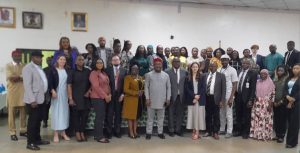NHRC Raises Alarm Over Deadly July Violence, Records Over 331,000 Rights Complaints

The National Human Rights Commission (NHRC) has described July 2025 as one of the most troubling months in recent memory for human rights in Nigeria, reporting 331,035 complaints and a disturbing increase in killings, particularly among vigilante groups and law enforcement agents.
Speaking at the official presentation of the July Human Rights Situation Dashboard in Abuja, Dr. Tony Ojukwu, OFR, SAN, Executive Secretary of the NHRC, warned that the country is “facing a deepening human rights crisis,” and called on all stakeholders to act decisively to halt the erosion of dignity, justice, and security across Nigeria.
“These are not new issues, but their persistence underscores systemic problems we cannot normalize,” Dr. Ojukwu said. “When dignity is undermined by those tasked with upholding the law, the social contract begins to erode.”
The Commission highlighted that July marked the deadliest month yet for vigilante groups, with nearly 100 fatalities. These groups, often the first line of community defense, have played a key role in supporting formal security agencies, especially in rural and conflict-prone areas.
“Their decimation portends danger for our collective security and the enjoyment of our liberties,” Ojukwu warned, stressing that these incidents are not isolated but symptomatic of a larger failure in security, justice, and accountability mechanisms.
In Sokoto, 15 men were killed in a reprisal attack, while in Kebbi, three police officers were gunned down during a botched abduction attempt. The NHRC dashboard also pointed to a surge in targeted killings of law enforcement agents, banditry, cult-related violence, and frequent kidnappings.
Also, the NHRC commended recent breakthroughs by security forces, including the arrest of leaders of Ansaru, a terrorist group implicated in numerous atrocities. Dr. Ojukwu urged the swift prosecution of those responsible for such grave crimes, emphasizing the need for justice and accountability.
“We commend the DSS, Armed Forces, and Office of the National Security Adviser. However, we call on authorities to ensure swift trials and the highest accountability standards,” he said.
The dashboard shows that law enforcement abuses, freedom from discrimination, and violations of economic, social, and cultural rights remain among the most common complaints.
The NHRC also thanked its state offices, civil society partners, and international allies such as the United Nations Development Programme, which has supported its efforts through the Tripartite Partnership Programme (TPP).
“To the people of Nigeria, we hear you. We see you. And we will not stop advocating for a society where your rights are respected, your dignity upheld, and your future protected,” Dr. Ojukwu concluded.
